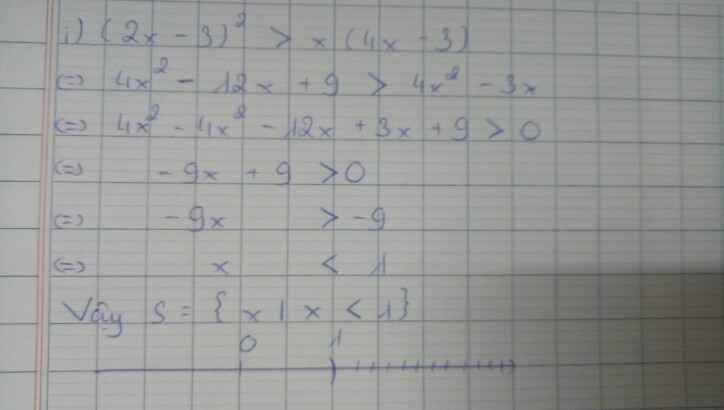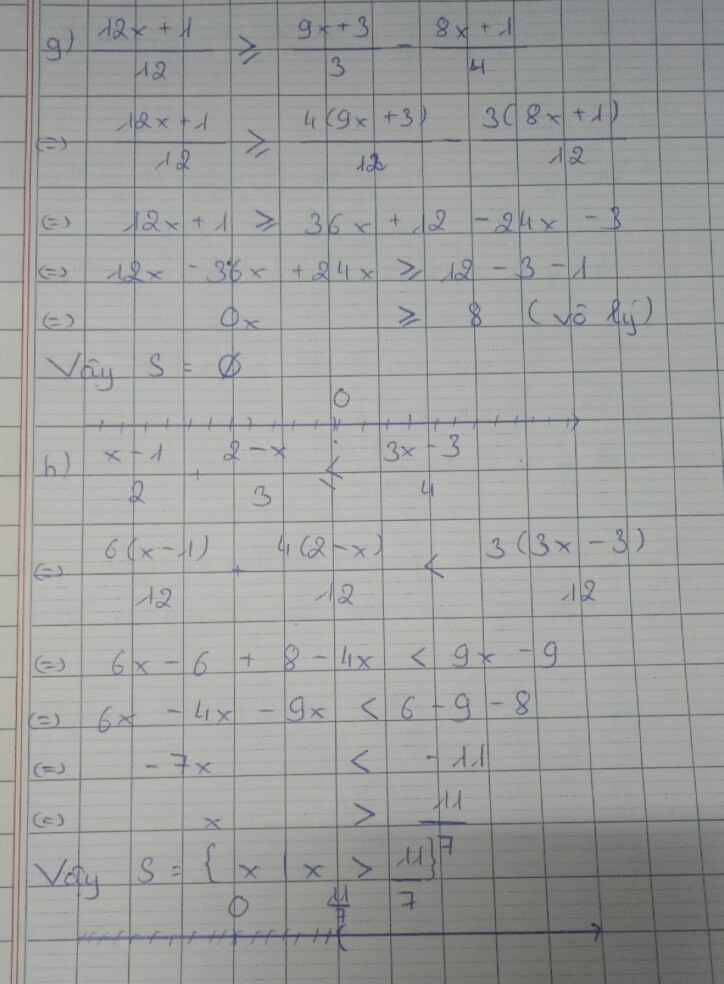Hãy nhập câu hỏi của bạn vào đây, nếu là tài khoản VIP, bạn sẽ được ưu tiên trả lời.

a) \(\dfrac{2-x}{3}-x-2\le\dfrac{x-17}{2}\) \(\Leftrightarrow\) \(6\left(\dfrac{2-x}{3}-x-2\right)\le6\left(\dfrac{x-17}{2}\right)\) \(\Leftrightarrow\) 4-2x-6x-12\(\le\)3x-51 \(\Leftrightarrow\) -2x-6x-3x\(\le\)-51-4+12 \(\Leftrightarrow\) -11x\(\le\)-43 \(\Rightarrow\) x\(\ge\)43/11.
b) \(\dfrac{2x+1}{3}-\dfrac{x-4}{4}\le\dfrac{3x+1}{6}-\dfrac{x-4}{12}\) \(\Leftrightarrow\) \(12\left(\dfrac{2x+1}{3}+\dfrac{4-x}{4}\right)\le12\left(\dfrac{3x+1}{6}+\dfrac{4-x}{12}\right)\) \(\Leftrightarrow\) 8x+4+12-3x\(\le\)6x+2+4-x \(\Leftrightarrow\) 8x-3x-6x+x\(\le\)2+4-4-12 \(\Leftrightarrow\) 0x\(\le\)-10 (vô lí).
a) \(\dfrac{2-x}{3}-x-2\le\dfrac{x-17}{2}\)
\(\Leftrightarrow2\left(2-x\right)-6\left(x+2\right)\le3\left(x-17\right)\)
\(\Leftrightarrow4-2x-6x-12\le3x-51\)
\(\Leftrightarrow-11x\le-43\)
\(\Leftrightarrow x\ge\dfrac{43}{11}\)
Vậy S = {\(x\) | \(x\ge\dfrac{43}{11}\) }
b) \(\dfrac{2x+1}{3}-\dfrac{x-4}{4}\le\dfrac{3x+1}{6}-\dfrac{x-4}{12}\)
\(\Leftrightarrow4\left(2x+1\right)-3\left(x-4\right)\le2\left(3x+1\right)-\left(x-4\right)\)
\(\Leftrightarrow8x+4-3x+12\le6x+2-x+4\)
\(\Leftrightarrow0x\le-10\) (vô lý)
Vậy \(S=\varnothing\)

a) Ta có: \(2\left(3x+1\right)-4\left(5-2x\right)>2\left(4x-3\right)-6\)
\(\Leftrightarrow6x+2-20+8x>8x-6-6\)
\(\Leftrightarrow14x-18-8x+12>0\)
\(\Leftrightarrow6x-6>0\)
\(\Leftrightarrow6x>6\)
hay x>1
Vậy: S={x|x>1}
b) Ta có: \(9x^2-3\left(10x-1\right)< \left(3x-5\right)^2-21\)
\(\Leftrightarrow9x^2-30x+3< 9x^2-30x+25-21\)
\(\Leftrightarrow9x^2-30x+3-9x^2+30x-4< 0\)
\(\Leftrightarrow-1< 0\)(luôn đúng)
Vậy: S={x|\(x\in R\)}

\(\Leftrightarrow4\left(5x^2-3\right)+5\left(3x-1\right)< 10x\left(x+3\right)-100\)
\(\Leftrightarrow20x^2-12+15x-5< 10x^2+30x-100\)
\(\Leftrightarrow10x^2-15x+83< 0\)
\(\Leftrightarrow10\left(x-\frac{3}{4}\right)^2+\frac{619}{8}< 0\)
Bất phương trình vô nghiệm

1: =>2(x+2)>3x+1
=>2x+4-3x-1>0
=>-x+3>0
=>-x>-3
=>x<3
2: =>12x^2-2x>12x^2+9x-8x-6
=>-2x>-x-6
=>-x>-6
=>x<6
3: =>4(x+1)-12>=3(x-2)
=>4x+4-12>=3x-6
=>4x-8>=3x-6
=>x>=2
4: =>-5x<=15
=>x>=-3
5: =>3(x+2)-5(x-2)<30
=>3x+6-5x+10<30
=>-2x+16<30
=>-2x<14
=>x>-7
6: =>5(x+2)<3(3-2x)
=>5x+10<9-6x
=>11x<-1
=>x<-1/11

g: =>12x+1>=36x+12-24x-3
=>12x+1>=12x+9(loại)
h: =>6(x-1)+4(2-x)<=3(3x-3)
=>6x-6+8-4x<=9x-9
=>2x+2<=9x-9
=>-7x<=-11
=>x>=11/7
i: =>4x^2-12x+9>4x^2-3x
=>-12x+9>-3x
=>-9x>-9
=>x<1

a: \(\Leftrightarrow20x^2-12x+15x+5< 10x\left(2x+1\right)-30\)
\(\Leftrightarrow20x^2+3x+5< 20x^2+10x-30\)
=>3x+5<10x-30
=>-7x<-35
hay x>5
b: \(\Leftrightarrow4\left(5x-20\right)-6\left(2x^2+x\right)>4x\left(1-3x\right)-15x\)
\(\Leftrightarrow20x-80-12x^2-6x>4x-12x^2-15x\)
=>14x-80>-11x
=>25x>80
hay x>16/5


ĐKXĐ: \(x\ne1,-1\)
Ta có: \(\dfrac{x-2}{x+1}\ge\dfrac{3x+2}{x-1}-2\)
\(\dfrac{x-2}{x+1}\ge\dfrac{3x+2-2\left(x-1\right)}{x-1}\)
\(\dfrac{x-2}{x+1}-\dfrac{3x+2-2x+2}{x-1}\ge0\)
\(\dfrac{x-2}{x+1}-\dfrac{x+4}{x-1}\ge0\)
\(\dfrac{\left(x-2\right)\left(x-1\right)-\left(x-4\right)\left(x+1\right)}{x^2-1}\ge0\)
\(\dfrac{x^2-3x+2-x^2+3x+4}{x^2-1}\ge0\)
\(\dfrac{6}{x^2-1}\ge0\)
\(\Rightarrow x^2-1>0\Leftrightarrow x^2>1\Leftrightarrow\left\{{}\begin{matrix}x< -1\\x>1\end{matrix}\right.\)(TM)
\(BPT\Leftrightarrow\dfrac{\left(x-2\right)\left(x-1\right)}{\left(x+1\right)\left(x-1\right)}\ge\dfrac{\left(3x+2\right)\left(x+1\right)}{\left(x+1\right)\left(x-1\right)}-\dfrac{2\left(x+1\right)\left(x-1\right)}{\left(x+1\right)\left(x-1\right)}\)
\(\Rightarrow x^2-x-2x+2-3x^2-3x-2x-2-2x^2-2\ge0\)
\(\Leftrightarrow-4x^2-8x-2\ge0\)
\(\Leftrightarrow x^2+2x+\dfrac{1}{2}\ge0\)
\(\Leftrightarrow\left(x+1\right)^2-\dfrac{1}{2}\ge0\)
Vậy bất phương trình luôn đúng \(\forall x\).